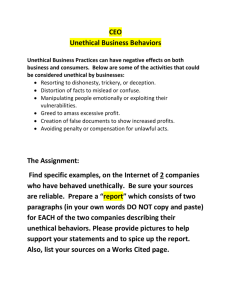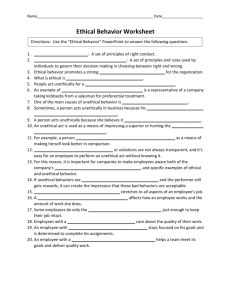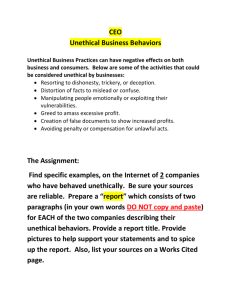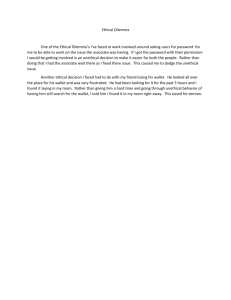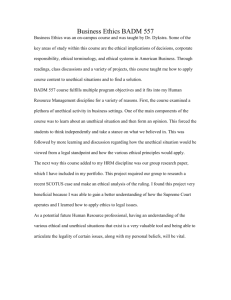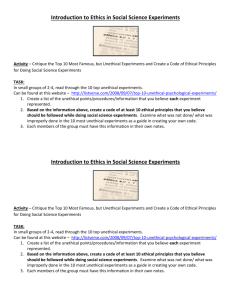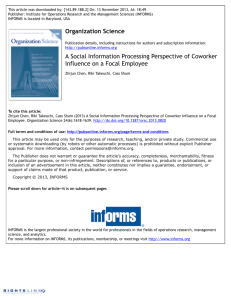Nwaka Isamah Professor Lopez Honors Business Ethics March 1
advertisement
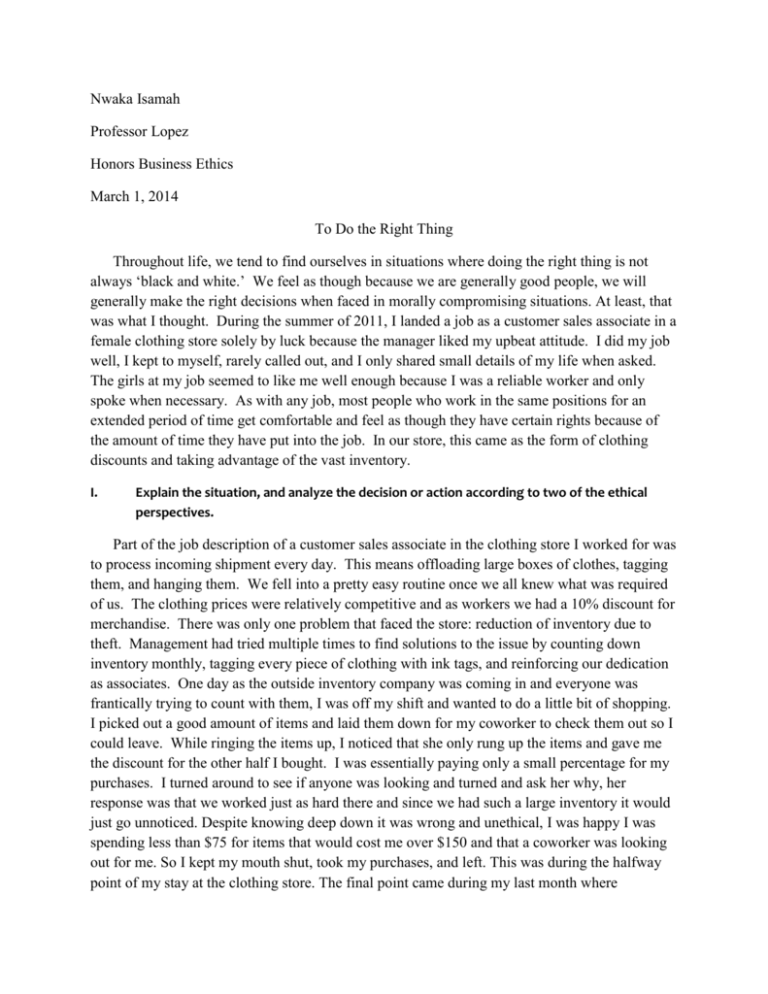
Nwaka Isamah Professor Lopez Honors Business Ethics March 1, 2014 To Do the Right Thing Throughout life, we tend to find ourselves in situations where doing the right thing is not always ‘black and white.’ We feel as though because we are generally good people, we will generally make the right decisions when faced in morally compromising situations. At least, that was what I thought. During the summer of 2011, I landed a job as a customer sales associate in a female clothing store solely by luck because the manager liked my upbeat attitude. I did my job well, I kept to myself, rarely called out, and I only shared small details of my life when asked. The girls at my job seemed to like me well enough because I was a reliable worker and only spoke when necessary. As with any job, most people who work in the same positions for an extended period of time get comfortable and feel as though they have certain rights because of the amount of time they have put into the job. In our store, this came as the form of clothing discounts and taking advantage of the vast inventory. I. Explain the situation, and analyze the decision or action according to two of the ethical perspectives. Part of the job description of a customer sales associate in the clothing store I worked for was to process incoming shipment every day. This means offloading large boxes of clothes, tagging them, and hanging them. We fell into a pretty easy routine once we all knew what was required of us. The clothing prices were relatively competitive and as workers we had a 10% discount for merchandise. There was only one problem that faced the store: reduction of inventory due to theft. Management had tried multiple times to find solutions to the issue by counting down inventory monthly, tagging every piece of clothing with ink tags, and reinforcing our dedication as associates. One day as the outside inventory company was coming in and everyone was frantically trying to count with them, I was off my shift and wanted to do a little bit of shopping. I picked out a good amount of items and laid them down for my coworker to check them out so I could leave. While ringing the items up, I noticed that she only rung up the items and gave me the discount for the other half I bought. I was essentially paying only a small percentage for my purchases. I turned around to see if anyone was looking and turned and ask her why, her response was that we worked just as hard there and since we had such a large inventory it would just go unnoticed. Despite knowing deep down it was wrong and unethical, I was happy I was spending less than $75 for items that would cost me over $150 and that a coworker was looking out for me. So I kept my mouth shut, took my purchases, and left. This was during the halfway point of my stay at the clothing store. The final point came during my last month where management had been replaced and the district manager was our new manager. No one liked the new manager and people did whatever they could to not listen to her behind her back, especially my coworker. Before I was ready to depart for school I wanted to do a little more shopping again, so I bought a decent amount of clothing but noticed this time she only rung up about 4 items out of the 13. Internally, I could not handle it. I wanted the discount but I knew what we were doing was essentially stealing. I took my bags and left, mouth shut with a heavy heart. The wrong of what I had been a part of weighed me down so much that I had to turn around to the store, give her back my items and tell her to ring them up without a discount. She was surprised at my behavior, but I told her I could not stand for it and it just did not feel right cheating the store like that. She smiled and called me a “good person.” I do not know what has happened to her or the policies that changed in the store but I will always remember the situation because I had the power from the first time to say no, but I kept my mouth shut and at the last minute when guilt ate me up so bad that I had to do the right thing, I was deemed a ‘good person.’ According to the deontological perspective which asserts that “we have to make choices based on our duty to follow universal truths that are imprinted on our consciences” (Johnson) my decision would have been unethical from the beginning; it was a “violation of the moral laws” (Johnson) but I did nothing about it till the very end. From the deontological perspective, once I realized what my coworker was doing, I owed it not only to myself, but to her, and the store to put a stop to the unethical behavior because what we did was cheating. Cheating was a major violation to the universal law of good and duty and I had the obligation to set things straight from the beginning. From the utilitarian perspective which focuses on right and wrong based on the consequences on choosing one action over the other, my decision would have been unethical because the cost outweighed the benefit. Consider that I spent less than $75 for a purchase that would have cost me over $150, however, savings of money would not have compared to the loss of a job, the loss of my coworkers job, and the tarnished reputation that would have come along if management had found out. I, my coworker, and management are not the only stake holders that would have been affected. The integrity of all the other employees would have come into question, corporate would be affected because of the loss of profits from products they could have sold, and customers would be affected because of the loss of one more product that they could have bought to make them happy. My selfishness was at the expense of other stake holders, and from the utilitarian perspective, I was not benefitting the greater good at the cost of one, I was benefitting myself at the cost of many, which was quite unethical. Regardless of whichever ethical perspective, the decision I made with my coworker would have still been unethical. II. In this section analyze why you think that the person or people involved did what they did. What biases or other causes of decision impairment (personal, situational, organizational) led to the unethical decision/action? What role did the corporate culture play? In this situation, I was too scared to speak up and pay for my items the right way and because I had never been in such a situation that I did not know how to react. I did not want anyone around us to know what was going on and make a scene because I did not want to cost my coworker her job. Such a situation is reminiscent of the Justin Paperny incident, Paperny knew what he was doing was wrong but, just like me, he kept his mouth shut. The guilt led him to weight gain, stress, and smoking; whereas, the guilt led me to paranoia and excessive remorse. For me, this decision was a form of incrementalism (Anand et al, 2004), I had never been exposed to the type of behavior and I was fairly new to the work force, but it seemed as though this type of behavior was common among the girls who rang each other out. The result of such an action certainly led to some cognitive dissonance because I struggled for a while in justifying my actions, was I right to accept since I worked there or was I wrong because it was cheating? On the other hand my coworker had the ‘denial of injury’ and ‘balancing the ledger’ mindset. She felt her actions were harming no one because we had such a large inventory and wealthy corporate office, they would not miss a few clothes that went missing that were already always missing. From the balancing the ledger aspect, she felt that she worked hard enough to deserve deeper discounts at the store, especially for clothes that did not sell as much. Her overall justification for her actions was that we worked hard enough and the store would not miss a few clothes that were unaccounted for because we employees had discounts anyway. On both of our parts, the biases were strictly personal. The culture of the store was fairly lackadaisical. We all came in, clocked in, did our jobs, and went home. There was no sense of “I love my job” and management definitely did not make it seemed that they loved us back. It was just a typical part time job and we worked there just to make a few extra dollars. This type of culture also created a dissonance between the employees on the floor and the district manager. She was a very distant woman who was not afraid of criticism and firing employees. Because we were also a problem store, she managed to come to the store unannounced almost every week and add extra tasks to our already busy schedule. Having a relaxed attitude to the store and distant relationship with the corporate manager made the culture very lackadaisical and left room for a lot of unethical decisions. According to the Wall Street article, culture is a very strong factor for employees especially when it comes to whistleblowing. The relaxed attitude and small amount of employees made whistleblowing at such an environment very difficult and unappealing. III. Discuss how this unethical action could have been prevented by organization, specific people within the organization, or perhaps a law/regulation from outside the organization, and the obstacles that exist in pursuing these solutions. Since there was a good amount of inner turmoil within the company, associate loyalty to the store was at a minimal. Managers were always bickering, theft was always occurring, and my coworkers were much more interested in their personal lives than into the store. One could say morale was not as prominent as it should have been. There was no system of checks on the employees because of the nonchalant atmosphere. Also, because we were just about 20 workers, speaking up about unethical behavior was rather difficult because these were people you saw almost every day. According to the Bloxham article, “the smaller the environment and the community involved in making a decision, the less likely there will be a whistle blower” (Bloxham, 2010). This is very true because I knew my coworker, I liked working with her, and we worked together almost every day; ratting her out and putting her job on the line just for trying to look out for me just did not seem right at the time. For such actions to prevented, management should definitely look into ways of increasing morale. From experience as an employee, it just felt like we were just workers they could simply replace if we did not follow the rules. The store was open 7 days a week, we made minimum wage, and because corporate executives were Jewish, we were open most major holidays. It was very hard to respect and organization that hardly valued you as an employee. I say these things because at my current job at the candy store, our opinions are valued so much that the owners of the store frequently ask us clerks about how we feel about certain changes and implementations. By valuing the employees, they would not feel that stealing merchandise would be a good way to get back at the employer for its nonchalant demeanor towards them. Whistleblowing in such a small storefront is very hard because you are not only risking your job but everyone else’s job. Many of the unethical decisions I witnessed being made and took part in were all because we felt undervalued as employees and had that “if they don’t care, we don’t care” mentality. By changing such a culture and visibly showing that they did care about the employees; turnover, theft, and overall unethical decisions would have greatly decreased. Unsatisfactory = 0-1 / Satisfactory = 2 / Excellent = 3 Criteria Level 0/1 point Level 1 2points Level 2/ 3-4 points Level 3/5 points Identification of Issues Identification of ethical /social concerns is sparse or missing. Identifies some of the ethical/social concerns in a given problem/case. Some important points are missing. Identifies most of the ethical/social concerns in a given problem/case. Most significant points are identified. Completely and thoughtfully identifies all ethical/social concerns in a given problem/case. Supports Arguments Inconsistent in articulation of position and/or offers little or no supporting evidence. Most points are supported with adequate information. Some important points are missing and/or support for positions lacks substantial explanation. Able to support a position with adequate information and few logical fallacies. Able to support a position with a substantial amount of information, little or no bias, and valid arguments. Integration of Course Concepts Very few course concepts integrated. Integrates some course concepts, however, with some inaccuracies. Integrates course concepts fairly well, with few inaccuracies. Integrates course concepts consistently and accurately. Level 0-1 point Level 1 – 2 points Level 2 – 3 points Paper is disorganized; little flow; vague; difficult to understand. Presentation flows smoothly with occasional confusion or rough patches between ideas. Presentation is smooth, polished and organized; flows well. Errors are so numerous that they obscure meaning. Occasional errors in writing, but they don’t represent a major distraction. Criteria Structure Language Writing is free or almost free of errors.

